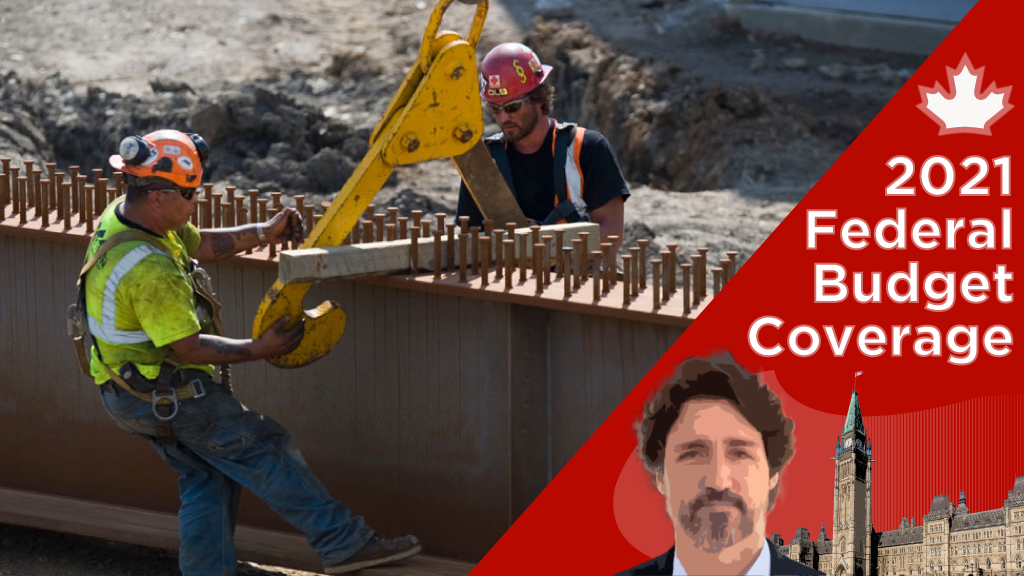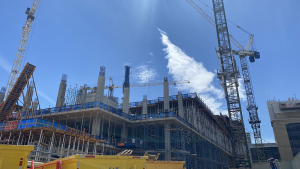As the country begins to digest the recently released federal budget, Alberta and B.C. are looking at how federal spending may help the west recover from the COVID-19 pandemic and historic economic challenges in the energy sector.
Alberta
Alberta President of Treasury Board and Minister of Finance Travis Toews noted the budget’s support of green technology like carbon capture, utilization and storage was encouraging for the province, but had concerns, especially regarding the exclusion of enhanced oil recovery projects with a net-zero carbon profile from benefits.
The province also lamented increases in payroll taxes.
“This increase in payroll taxes represents even more future net transfers of Albertan’s tax dollars to other parts of the country,” he said.
Reactions from the Building Trades of Alberta were also mixed. The group stated in a blog post to members that there were several line items re-announcing existing infrastructure funding and they would have liked to see the inclusion of skilled labour mobility, community benefits agreements tied to national infrastructure spending and new infrastructure stimulus.
“However, there is a lot in the budget that will help to continue building Canada’s skilled trades workforce,” wrote the group. “We need to ensure that funds that have been committed – in Budget 2021 and previously – flows out the door, putting shovels in the ground and people to work, faster.”
Bill Black, president of the Calgary Construction Association, also expressed concerns about the budget.
“I would suggest that our province has an even greater sense of urgency around the need for stimulus and investment due to the tough economic conditions that we have experienced now over several years,” said Black. “These have stretched many of our member firms to the maximum as they have fought to survive through a prolonged downturn and now a pandemic.”
He stated lifting of wage subsidy programs could place heavy pressure on many of these organizations, leading to consequences later this year.
We do not believe this budget is good for Fort McMurray
— Keith Plowman
Fort McMurray Construction Association
“Even with our work ethic and such a resilient industry, we have plenty of heavy lifting ahead of us and, sadly, this budget offers very little tangible relief for a battle-worn Alberta construction sector and certainly very little in the near term,” said Black.
Industry advocates in Fort McMurray did not mince words.
“We do not believe this budget is good for Fort McMurray,” said Keith Plowman, president of the Fort McMurray Construction Association (FMCA). “We are disappointed there was little or no mention of stimulus projects to encourage success or growth in the local construction industry. There was no plan of action to address the infrastructure deficit which currently sits at over $2 billion, nationally. Getting those projects moving will inject much needed stimulus into the economy and close the infrastructure deficit.”
The FMCA believes switching the home energy retrofit program from grants to loans will significantly reduce opportunities for small and medium contractors in the province.
“We’ve seen a number of local businesses, including FMCA members, close their doors during the pre-COVID recession and during the pandemic, and families living paycheque to paycheque,” said Plowman. “They can’t afford another cost.”
Plowman also was not convinced of how $101.4 billion in new spending over three years will fuel the economic recovery and start the transition to a green economy.
“Given this area has often been described as the economic engine of this country, there was little commitment to it, including the construction of an east-west pipeline which would stimulate the economy and bolster construction, both here and across the country,” said Plowman. “(Justin Trudeau’s) anti-oilsands stance was clear.”
B.C.
On the West Coast, reception to the budget was warmer.
Metro Vancouver, a federation of 21 B.C. municipalities in the lower mainland, praised the budget for its focus on green infrastructure and inclusivity.
“The pandemic has exacerbated vulnerabilities in our systems and placed an unacceptable and disproportionate burden on those who can least afford it, including racialized people, youth, new Canadians and women,” said Sav Dhaliwal, chair of Metro Vancouver’s board of directors in a press release. “The Government of Canada has clearly signalled its commitment to addressing issues like climate change, social equity, reconciliation, affordable housing, and the environment as we work together to set our region up for success in the digital economy.”
Dhaliwal noted the budget will help support critical projects in the region, like the Iona Island Wastewater Treatment Plant, which will be built to replace an existing primary-level treatment plant in Richmond with a completion date of 2030.
The Independent Contractors and Businesses Association (ICBA) appreciated commitments to financially support employers who hire apprentices and people from underrepresented groups.
“That is a good and practical way to address what in B.C. is the biggest issue facing construction: a shortage of workers,” said ICBA president Chris Gardner, noting the coming decade will see 60,000 construction roles that need to be filled. “I think more needs to be done on the training file provincially and federally, but this is certainly a good announcement.”
Gardner also noted he was not surprised at the levels of spending and debt.
“We are still going through a global pandemic, the likes of which we have not seen in more than 100 years,” he said. “Every single economy has been rocked in a significant way and the world is all focused on economic recovery. It is not a surprise for the government to be supporting impacted parts of the population.”
British Columbia Construction Association president Chris Atchison echoed Gardner’s comments on the positive announcement regarding apprentices but did express concern with infrastructure funding.
“I would say that we’re somewhat disappointed that there isn’t more new infrastructure investment offered,” he wrote in an email to the Journal of Commerce. “However, we are glad to see more supports for apprentices and Red Seal training and job placement. All that said, without a clear and decisive move toward prompt payment legislation in B.C., the actual infrastructure budget here in B.C. is five per cent less than we think it is, and this is happening at a time when every dollar counts.”
Follow the author on Twitter @RussellReports.











Recent Comments
comments for this post are closed